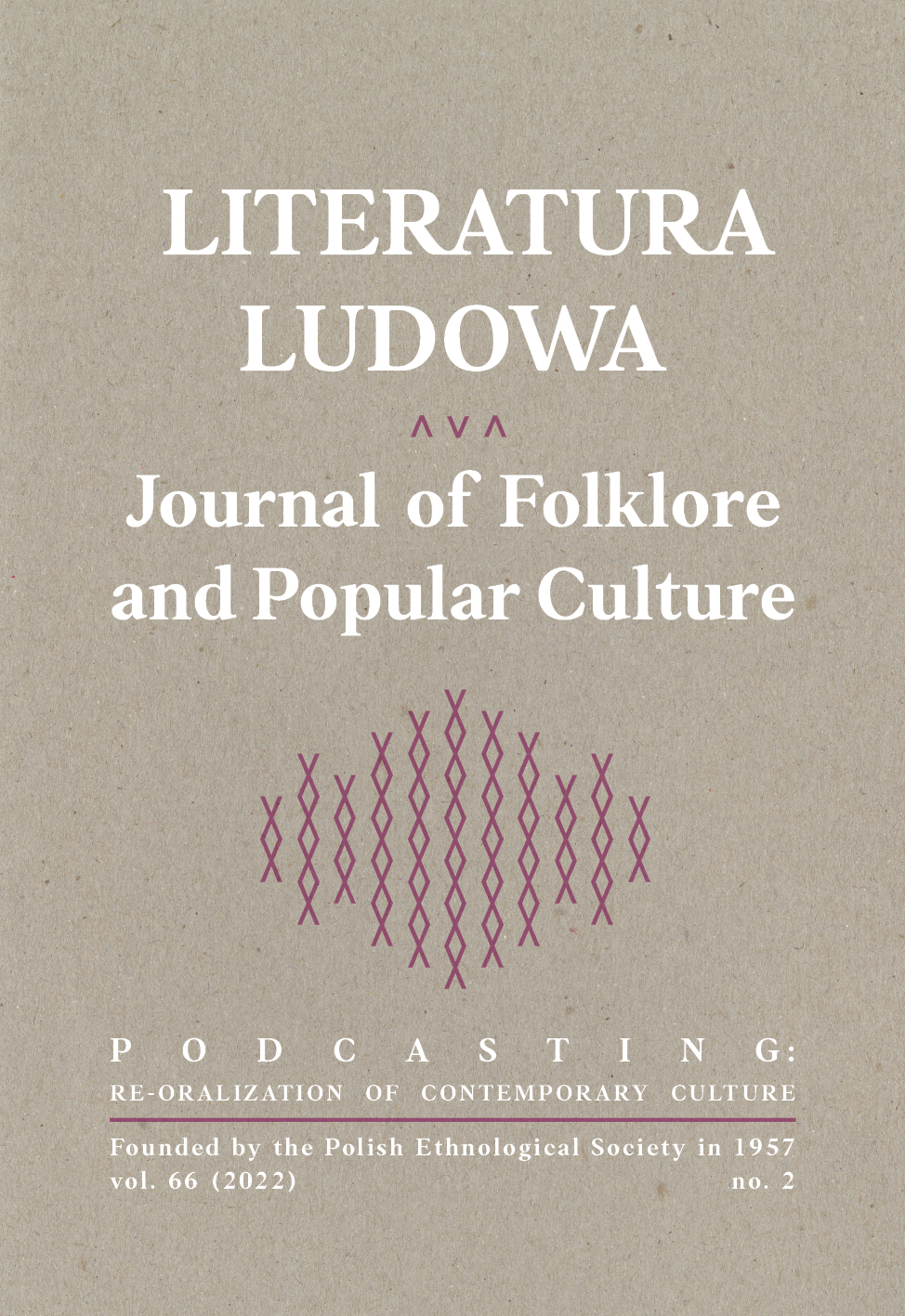LGBTQ+ Representation in Fictional Podcast Series
DOI:
https://doi.org/10.12775/LL.2.2022.002Keywords
LGBTQ , representation, podcasts, new media, niche audience, patronageAbstract
The article offers an analysis of the frequency and quality of LGBTQ+ representation in fictional podcasts. I examine how frequently and with what intent LGBTQ+ characters are included in this medium. This research aims to fill the gap in academic work on LGBTQ+ representation in podcasts. Though scholars note an increase in representation in mainstream media, LGBTQ+ media consumers, especially young people, still look to other sources for validation of their identities. Many LGBTQ+ people look to fictional podcasts as a source of quality representation, especially because podcasts are small-scale and rely on the funding, and thus the opinion, of listeners (Bottomley, 2015). In this paper, I analyze four fictional podcast series for LGBTQ+ inclusivity. I note how many LGBTQ+ characters are included and in what proportion. I assess the quality of representation in four ways: diversity, depth, and the frequency and type of stereotypical LGBTQ+ tropes. My findings show a high frequency of LGBTQ+ characters and diversity of personalities and backgrounds, opportunities for these characters to express their sexual and/or gender identities as well as LGBTQ+ trope subversions. Thus, we see that fictional podcasts, as a medium that sustains itself by listeners’ patronage, present stories that their audience can relate to. As a result, fictional podcasts create more niche stories that make connections with smaller demographics of media consumers.
References
Andrew, J. B. (2015). Podcasting, Welcome to Night Vale, and the Revival of Radio Drama. Journal of Radio & Audio Media, 22(2), 179–189. https://doi.org/10.1080/19376529.2015.1083370
Best, J. (2018–2020). The Strange Case of Starship Iris [Audio podcast]. Procyon Podcast Network. https://www.procyonpodcastnetwork.com/starship-iris
Cook, C. (2018). A content analysis of LGBT representation on broadcast and streaming television [B.A. thesis, University of Tennessee at Chattanooga]. Student Research, Creative Works, and Publications. https://scholar.utc.edu/honors-theses/128
Crisler, M.M. (2019). The effects of biased literature on self- and social-perceptions of LGBTQ individuals [Undergraduate honors thesis, University of Nebraska-Lincoln]. DigitalCommons@University of Nebraska-Lincoln. https://digitalcommons.unl.edu/honorstheses/179/
Fink, J., Cranor, J. (2012-ongoing). Welcome to Night Vale [Audio podcast]. Welcome to Night Vale. https://www.welcometonightvale.com/
Gillig, T.K., Murphy, S.T. (2016). Fostering Support for LGBTQ Youth? The Effects of a Gay Adolescent Media Portrayal on Young Viewers. International Journal of Communication, 10, 3828–3950.
Gomillion, S.C., Giuliano, T.A. (2011). The Influence of Media Role Models on Gay, Lesbian, and Bisexual Identity. The Journal of Homosexuality, 58, 330–354.
Kaner, S., Vibert, K. (2017-ongoing). The Penumbra Podcast [Audio podcast]. The Penumbra Podcast. http://www.thepenumbrapodcast.com/
Ketchum, D.L. (2014). Transmission: Premium Television Characters Outside of the Gender Binary (M.A. Thesis, University of Denver]. Digital Commons @ DU. https://digitalcommons.du.edu/etd/336
McLaughlin, B. (2017). Identifying With a Stereotype: The Divergent Effects of Exposure to Homosexual Television Characters. The Journal of Homosexuality, 64(9), 1196–1213.
TV Tropes (n.d.). Queer as Tropes. TV Tropes. Retrieved September 15, 2022 from: https://tvtropes.org/pmwiki/pmwiki.php/Main/QueerAsTropes
Rae, I. (2016–2017). FRUIT [Audio podcast]. Stitcher. https://www.stitcher.com/show/issa-rae-presents-fruit
Shaw, A., Lauteria, E., Yang, H., Persaud, C.J., Cole, A.M. (2019). Counting Queerness in Games: Trends in LGBTQ Digital Game Representation, 1985–2005. International Journal of Communication,13, 1544–1569.
Stokes, Z., Townsend, M., Deerwater, R., Adams, N., Blacklow, J., Chambers, C., Schmider, A., Trasandes, M. (2019). Studio Responsibility Index 2019. GLAAD Media Institute.
Stokes, Z., Townsend, M., Deerwater, R., Adams, N., Trasandes, M., Blacklow, J., Ramos, A. (2019). Where We Are On TV 2018–2019. GLAAD Media Institute.
Downloads
Published
How to Cite
Issue
Section
License
Copyright (c) 2022 Emilia Ferreyra

This work is licensed under a Creative Commons Attribution-NoDerivatives 4.0 International License.
1. The authors give the publisher (Polish Ethnological Society) non-exclusive license to use the work in the following fields:a) recording of a Work / subject of a related copyright;
b) reproduction (multiplication) Work / subject of a related copyright in print and digital technique (ebook, audiobook);
c) marketing of units of reproduced Work / subject of a related copyright;
d) introduction of Work / object of related copyright to computer memory;
e) dissemination of the work in an electronic version in the formula of open access under the Creative Commons license (CC BY - ND 3.0).
2. The authors give the publisher the license free of charge.
3. The use of the work by publisher in the above mentioned aspects is not limited in time, quantitatively nor territorially.
Stats
Number of views and downloads: 1188
Number of citations: 0



